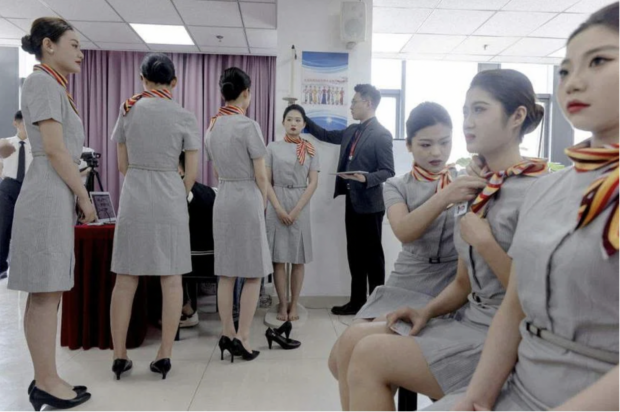
New guidelines issued by Hainan Airlines underscore the importance of maintaining a “professional image”. PHOTO: REUTERS
Female flight attendants working for China’s Hainan Airlines will be grounded if they are 10 percent above the “standard” weight limit, as part of the airline’s efforts to manage its employees’ image.
The weight of these flight attendants is determined by the formula of “height (cm) minus 110 = standard weight (kg)“, according to the local media.
Earlier in June, the Hainan-based carrier issued a new set of guidelines about its cabin crew’s appearance.
The guidelines reportedly aim to regulate the weight of female flight attendants and underscore the importance of maintaining a “professional image”.
The airline also hires male flight attendants, but it is not clear if the guidelines apply to them as well.
A weight monitoring system has also been implemented by the airline for its female flight attendants, reported Chinese news outlet Sixth Tone.
Being weighed on-site is among many processes that are part of the system.
Female flight attendants who are less than 5 per cent overweight will be monitored by the airline monthly to prevent them from putting on more weight.
Those who are between 5 per cent and 10 per cent overweight will undergo weekly weight checks for one month, reported Chinese newspaper Global Times.
Those who are more than 10 per cent overweight will be suspended immediately, and all other flight attendants in the same team will have to assist such staff to come up with weight reduction plans and monitor their weight loss.
“As a prominent representative of public service, we should serve as a captivating business card to the world,” said the airline, according to reports.
China’s aviation authorities do not specify weight standards for civil aviation personnel, reported Sixth Tone.
Hainan Airlines’ guidelines on weight requirements for female flight attendants have sparked public outcry in the country. Many have condemned the guidelines as a form of weight and sex discrimination.
An employee known only as Ms Huang told the local media that existing regulatory standards for flight attendants primarily focus on aviation safety.
There are no restrictive measures such as weight requirements, she was quoted as saying in the media reports.
“If airlines deprive overweight flight attendants of the right to work normally purely because of visual considerations, this is definitely discrimination,” said Ms Huang.
One netizen wrote on Chinese social media platform Weibo: “No need (for such guidelines). A thin and small flight attendant who does not have enough strength may not be able to serve passengers well and maintain order and safety in the air.”
Another commented: “If an air stewardess is too skinny, what happens if a passenger has problems (on the flight), how is the flight attendant going to run?”
Another questioned: “Why are the male flight attendants’ (weight) not being controlled?”
This is not the first time that an airline has imposed weight limits on its flight attendants.
In 2022, former Emirates cabin crew members reportedly claimed that their weight was regularly checked by the airline and that they could lose their jobs if they were “too heavy”.
Some of them claimed they were given two weeks to lose the extra weight or face pay cuts if they failed to do so.
In 2019, Pakistan International Airlines issued a memo to its cabin crew stating that they had six months to slim down to required weight limits or face being grounded.
Separately, in 2015, India’s national carrier asked 125 of its flight attendants to lose weight, or they would be offered an airport job or “ground duties”. At that time, Air India said the move was not about weight but “fitness level”.
RELATED STORIES